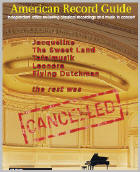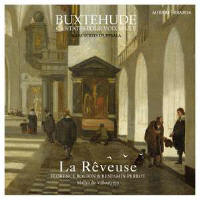Reviewer: Peter
Loewen
When in 1668 Dietrich
Buxtehude was appointed organist at the Marienkirche in Lübeck, he also took
over the responsibility of organizing the Abendmusiken—a public
concert series given annually in the Advent season. These concerts were a
source of civic pride and rivals, both in scale and quality, to the operas
produced in Hamburg. Several of the cantatas and sonatas on this program
were probably composed for the Abendmusiken, though most of them are
actually preserved in the Düben Collection, compiled by the Hofkapellmeister
Gustav Düben in the 1640s, 1650s, and 1710s for the royal court of Sweden.
This is an absolutely gorgeous recording, with some brilliant
singing by Mailys de Villoutreys and string playing by La Reveuse. Although
Dietrich Buxtehude's solo cantatas dominate, he shares the program with
other North German masters, namely Franz Tunder (1614–67), Heinrich Schütz,
Johann Philipp Förtsch (1652–1732), and Christian Geist (c. 1650–1711).
Tunder's exquisite 'Ach Herr, Lass Deine Lieben Engelein', which opens the
program, is in the familiar style of German lament—a two–part cantata with a
rich string sonata before and between the two arias. Johann Philipp
Förtsch's 'Aus Der Tiefen Ruf Ich Herr Zu Dir' has much of the same
character, though he indulges in more chromatic expression. Similar arias
occur among the works of Erlebach, Johann Michael Bach, and others. Compare,
for example, Franz Vitzthum's recording of Erlebach's aria 'Trocknet Euch
Ihr Heissen Zähren' (Christophorus 77366; July/Aug 2013). Buxtehude's 'Dixit
Dominus' is of a different character—full of joy, charged with a dance–like
exchange in triple meter between voice and violins (Stephan Dudermel and
Fiona–Emilie Poupard) in the 'Gloria Patri'. Geist's 'Resurrexi Adhuc Tecum
Sum' is more dramatic that Buxtehude's cantatas. He appears to borrow from
the style of contemporary Italian opera, moving swiftly from recitative to
aria–like music. The program closes with a wonderful performance of
Buxtehude's cantata Herr, Wenn Ich Nur Dich Habe. De Villoutreys's
singing is sensitive and tender as she seems to caress the long melismas
over what sounds like a descending ground bass. The instrumental music that
comes between the cantatas is every bit as expressive and demanding as the
pieces for voice. The Anonymous Sonata for Three Viols is full
of passage work that calls for
dexterity. In Buxtehude's Sonata VI in D minor from his Opus 1, musicians
navigate with breathtaking ease the wild shifts from one affect and tempo to
another. Altogether beautiful music and outstanding singing and playing.
Texts and notes are in
English.
Fermer la fenêtre/Close window
|




